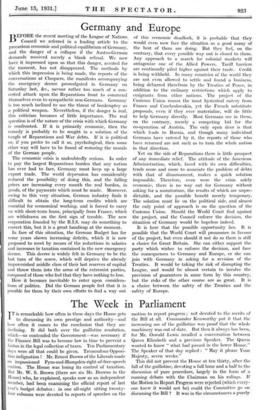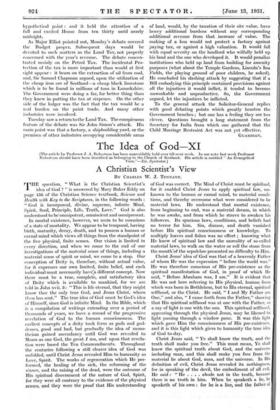The Week in Parliament
TT is remarkable how often in these days the House gets to discussing its own prestige and authority—and how often it comes to the conclusion that they are declining. It did both over the guillotine resolution, which—so contended the Government—was necessary if the Finance Bill was to become law in time to prevent a hiatus in the legal collection of taxes. Ten Parliamentary days were all that could be given. Tremendous Opposi- tion indignation ! Mr. Ernest Brown of the Liberals made an impassioned Pyna-and-Hampden-right-of-free-speech oration. The House was losing its control of taxation. But Mr. W. S. Brown (there are six Mr. Browns in the House) who, he explained, speaks now as an independent member, had, been examining the official report of last Year's budget debates : in one all-night sitting twenty- four columns were devoted to reports of speeches on the motion to report progress ; not devoted to the merits of the Bill at all. Commander Kenworthy put it that the increasing use of the guillotine was proof that the whole machinery was out of date. But then it always has been, for Mr. Oswald Lewis recalled a conversation between Queen Elizabeth and a previous Speaker. The Queen wanted to know " what had passed in the lower House." The Speaker of that day replied : " May it please Your Majesty, seven weeks."
This did not prevent the House at ten thirty, after the fall of the guillotine, devoting a full hour and a half to the discussion of pure procedure, largely in the form of a running debate with the Chairman on his rulings. If the Motion to. Report Progress were rejected, (which every- one knew it would not be) could the Committee go on discussing the Bill ? It was in the circumstances a purely hypothetical point : and it held the attention of a full and excited House from ten thirty until nearly midnight.
As Major Elliot pointed out, Monday's debate covered the Budget proper. Subsequent days would be devoted to such matters as the Land Tax, not properly concerned with the year's revenue. The debate concen- trated mainly on the Petrol Tax. The incidental Pro- tection of the tax is more important than would at first sight appear : it bears on the extraction of oil from coal, and, Sir Samuel Chapman argued, upon the utilization of the cheap iron ore of Scotland—a cheap black limestone which is to be found in millions of tons in Lanarkshire. The Government were doing a far, far better thing than they knew in putting the tax at sixpence. On the other side of the ledger was the fact that the tax would be a real burden on the paint trade. And many other industries were involved.
Tuesday saw a return to the Land Tax. The conspicuous feature of the debate was Sir John Simon's attack. His main point was that a factory, a shipbuilding yard, or the premises of other industries occupying considerable areas of land, would, by the taxation of their site value, have heavy additional burdens without any corresponding additional revenue from that increase of value. The making of a loss would not protect a factory against paying tax, or against a high valuation. It would fall with equal severity on the landlord who wilfully held up his land and the one who developed it. It would penalize institutions who held up land from building for amenity purposes (what about the Temple Gardens, Lincoln's Inn Fields, the playing ground of poor children, he asked). He concluded his slashing attack by suggesting that if a Bill embodying this principle contained provisions against all the injustices it would inflict, it tended to become unworkable and unproductive. So, the Government argued, let the injustices be inflicted.
To the general attack the Solicitor-General replies with good debating points which greatly hearten the Government benches ; but one has a feeling they are too clever. Questions brought a long statement from the Secretary for India from which one gathered that the Child Marriage Restraint Act was not yet effective.
GUARDIAN.







































 Previous page
Previous page